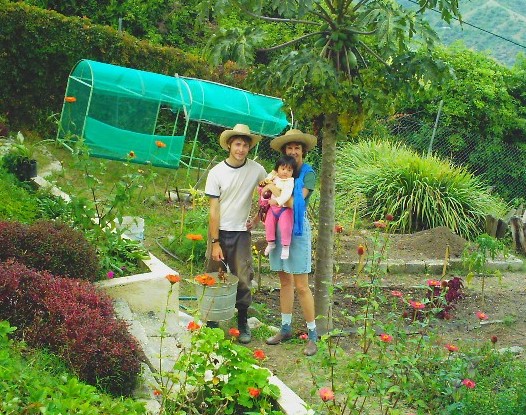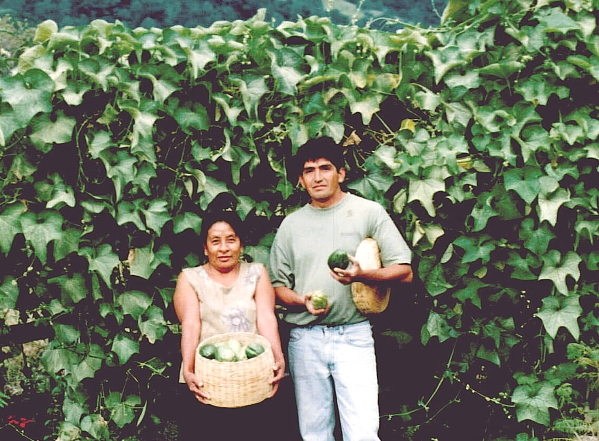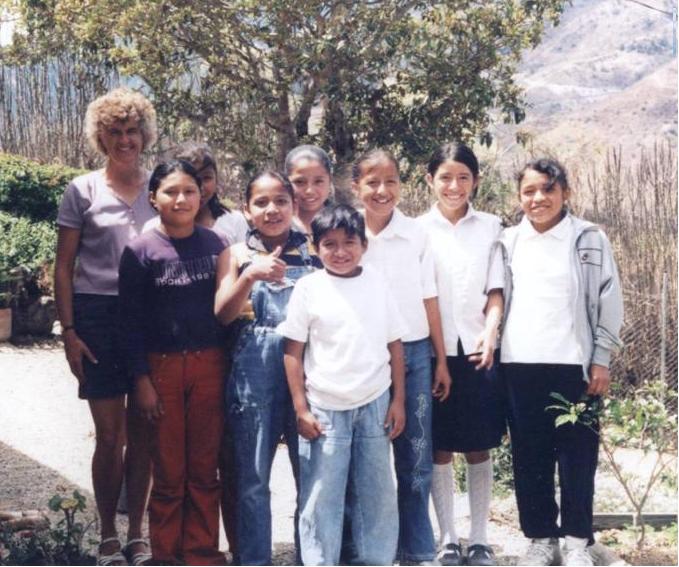# Sustainable Food Education Program
# Promoting permaculture as an answer to malnutrition and an alternative to chemical based farming

The Sexto Sol Center's Sustainable Food Production Program aims to reduce malnutrition and eliminate the use of agro-chemicals by teaching people how to grow their own food organically. The Sexto Sol Center promotes an alternative model of food production that combines biointensive, organic farming methods with the principles of permaculture. This model of sustainable food production offers great promise for improving production, restoring environmental integrity, improving nutrition and helping rural people to enjoy better quality of life. Permaculture helps address climate change as well. According to the Rodale Institute, if the world's agricultural lands were farmed organically, nearly 40% of the carbon emitted each year would be sequestered.
In this introductory section we provide context on the challenge of world hunger and describe the problems associated with the way people farm in the Sierra Madre. A description follows of Sexto Sol educational program at the Escuela de Agroecologia y Permacultura Tierra Linda in Motozintla and our work to establish permaculture garden projects at schools serving indigenous communities.
Food Security is the measure of how stable the sources of food are for a particular region. Ideally, local farmers and home gardeners produce enough nutritious food to provide an adequate diet for the people living there.
# Hunger in a world of plenty is the result of an ethical starvation at the core of human affairs.
According to the United Nations, 800 million people live in hunger. This astounding crisis is the result of mismanagement of natural resources and a distribution policy within and between nations that leaves people in the countryside in severe poverty. In India an average of six hundred farmers a year commit suicide because of the despair of not being able to pay their debts. This is not simply an unfortunate reality. It should be seen as compelling evidence of the failure of human society.

The Earth can produce what we need to live well. Hunger is caused by our institutions, our trading system and our sense of separation from fellow human beings. The good news is that given the fact that hunger is a human caused phenomenon, we therefore have the ability to eliminate it. We invite you to consider your participation in the existence of hunger. We hope you will then work toward building the necessary political consensus that will lead to the changes that are required.
A person comes into this world to learn and to reach their potential as a human being. Among all of the people co-inhabiting the planet with us right now, 800 million are suffering from lack of food. Consider this, that the challenge of hunger is not only about the needs of the hungry but also about the need of those of us with our bellies full to reach our own potential as human beings by acting proactively on behalf of others.
# The Problems with Agro-Chemicals: poor yields, health risks, water contamination
Farming is the main activity in the Sierra Madre of Chiapas, which is considered to be one of the most impoverished regions of Mexico. The ancient, sustainable ways of producing food still practiced by the Lacandon Maya have long been replaced here by farming methods that cause environmental destruction and perpetuate poverty.
Small scale campesino farmers lack access to the resources and information that would enable them to have better success with the cash crops they grow. They typically rely heavily on chemical fertilizers, pesticides and herbicides to remedy problems in their fields. Substances banned in the U.S. are available here or brought in from nearby Guatemala. Spraying with paraquat one of the infamous "dirty dozen", has replaced the traditional practice of using a hoe. The chemical is highly toxic to birds and is a serious health risk to farmers. It adheres to soil and when the fields are burned, can produce a very toxic smoke for up to thirteen years after it is applied.
Government development agencies usually promote the use chemical fertilizers and insecticides. Farmers are generally unaware of the dangers of using these chemicals and do not use any protective clothing when spraying. Typically the fumigating pump and the chemicals are kept along with the other tools in the living areas of their houses. It is common to hear of poisonings from the mishandling of these toxic substances.
With thousands of farmers fumigating their crops throughout this mountainous region, these poisons wash into the drainage affecting fish populations and seriously contaminating the water supply for the City of Motozintla and the many communities downstream. Most people simply boil this water for drinking and cooking, killing bacteria but concentrating the soluble chemicals. The foods farmers supply to the population of the region have chemical residues.
# "If you farm only corn, you will harvest only poverty"

Most farming families raise one crop a year of corn and some beans on steep un-terraced slopes. Their land lies fallow during the 6 months of the dry season. Soils are generally exhausted from over dependence on chemical fertilizers. In the spring after months of rainless weather, farmers burn the corn stalks to prepare for planting. This practice destroys organic matter further degrading soil quality. Poor soils yield sickly plants that are more susceptible to pest infestation. The farmers use chemicals to combat these pests. It is a vicious cycle.
In 1998, the practice of burning the fields in the dry season quickly sparked fires in the hot, dry hillsides. Large-scale fires damaged remaining stands of old-growth cloud forest as they burned uncontrolled for weeks. Yet each spring the burning begins again. The forests continue to disappear under the machete as people look for new areas to farm. With less forest cover, underground water levels have decreased. Springs that were once reliable no longer provide enough water.
Rural people use their land this way because they do not know of other alternatives. They live in poverty without knowing how to reach a better quality of life.
# Creating food security one household at a time for a better future for the children
La Escuela de Agroecología y Permacultura Tierra Linda is located on a ridge about a 15 minute walk from the center of Motozintla with a sweeping view of the river basin below and the dramatic rise of the Sierra Madre on all sides. Founded in 1999, at Escuela Tierra Linda we have provided training free of charge to over 800 small-scale peasant farmers, students, health promoters, and community members. We invite government agencies to the School to suggest that development programs should encourage food self-sufficiency on a household level and that it is possible to achieve without the use of toxic chemicals.

The farm is a north-facing slope on a severely eroded ridge and is typical of many deforested areas in the Sierra Madre. This unlikely spot has proven to be an excellent site for demonstrating how to return fertility to damaged land. Using organic soil building methods we have been able to transform this previously unproductive site into an attractive homestead where the productivity increases over time. In 2017 we harvested our first corn produced without chemical fertilizers. Neighbors let us know that they were surprised with the quality of the plants and the corn itself given that we relied manure and compost to amend the soil prior to planting. WE allowed a cover crop of velvet beans act to grow in between the corn stalks, acting as a nitrogen fixer, mulch that kept moisture in and eliminated the need to remove weeds.


In years past we showed visitors how to build small dams called swales to catch water at the Parque Ecologico where we had been regenerating a deforested hillside. At present we are preparing to incorporate more alternative technology into what we teach. The storage area is full of old water heaters, recycleable plastics and more, ready to be repurposed.
Land of this size is usually planted only with corn. By contrast we demonstrate how a small parcel can be made much more productive by growing fruit and nut trees, fish, poultry, vegetables and medicinal plants. Trees and perinneals can help regulate temperatures and serve as a windbreak. The "huerto familiar" or family vegetable garden shows that by managing well a small area, a family can produce a significant amount of nutritious organic produce.

Escuela Tierra Linda fills the need for a facility that serves as a living classroom to give people hands-on training. People can see how the methods function over time and receive help with problems they encounter with their own crops. The program was originally made possible by the generous support of the Stanley Smith Horticultural Trust. Other major contributors have been Patagonia and the Rosenlund Family.
# Permaculture, Biointensive and Organic Farming
The Sexto Sol Center actively promotes permaculture as a way to bring creativity and common sense to bear on how to use limited resources and solve site-specific problems caused by wind, poor soil, slope, and drought. We show people how they can produce an abundance of foods while at the same time creating a system where wastes are recycled, water is used wisely and energy consumption is reduced. In practice, permaculture creates a stable system that mimics nature and is therefore sustainable.




At Escuela Tierra Linda we teach biointensive, organic methods that rely on continually replenishing of the soil with compost, green manure, and other natural means. Properly practiced, the yields are higher than average and water consumption is less. This method is recognized as a promising alternative to chemical-based agriculture for small-scale vegetable and grain production in developing countries.
While people usually expect to be taught how to do these things, we are commited to providing them with enough information so that they can understand the natural processes involved. We believe that this level of horticultural education in the necessary to empower farmers and food gardeners to make good choices for managing their crops. It also is a delightful way to help people open up to the wonders of the natural world and to contribute to creating an ethic of stewardship.
Once coffee-growing families establish their own permaculture systems they will be freed from worry about basic survival and improve the quality of their lives.
 The Sexto Sol Center
The Sexto Sol Center 